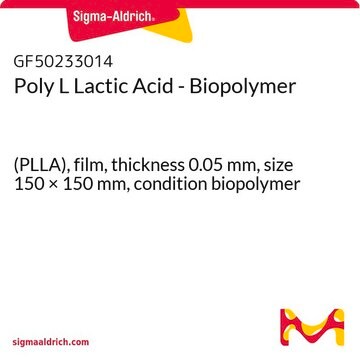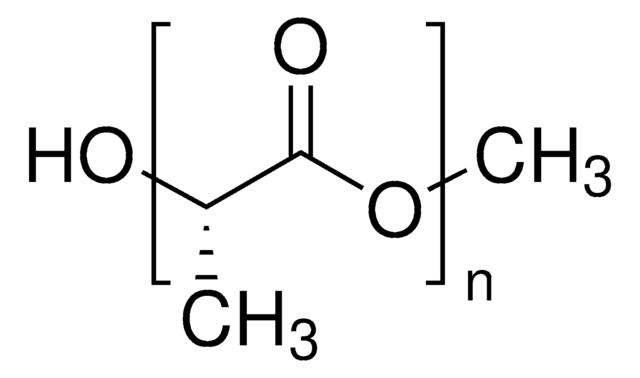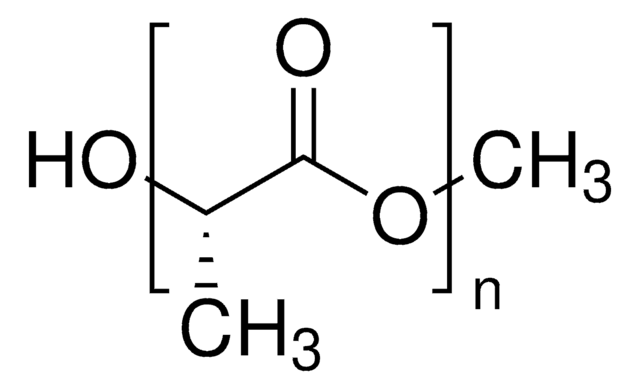93578
Poly(L-lactide)
viscosity ~1.0 dL/g, 0.1 % (w/v) in chloroform(25 °C)
Synonym(s):
L-Lactide polymer, PLA, Poly(L-Lactic acid)
Sign Into View Organizational & Contract Pricing
All Photos(1)
About This Item
Linear Formula:
CH3O(C6H8O4)nH
MDL number:
UNSPSC Code:
12162002
PubChem Substance ID:
NACRES:
NA.21
Recommended Products
description
ester terminated
form
solid
mol wt
Mn 59,000
Mw 101,000
degradation timeframe
>3 years
impurities
<0.5% water
viscosity
~1.0 dL/g, 0.1 % (w/v) in chloroform(25 °C)
Mw/Mn
<1.8
Looking for similar products? Visit Product Comparison Guide
Application
medical device
Other Notes
end group: dodecyl ester
Storage Class Code
11 - Combustible Solids
WGK
WGK 3
Flash Point(F)
Not applicable
Flash Point(C)
Not applicable
Personal Protective Equipment
dust mask type N95 (US), Eyeshields, Gloves
Certificates of Analysis (COA)
Search for Certificates of Analysis (COA) by entering the products Lot/Batch Number. Lot and Batch Numbers can be found on a product’s label following the words ‘Lot’ or ‘Batch’.
Already Own This Product?
Find documentation for the products that you have recently purchased in the Document Library.
Customers Also Viewed
Joon H Eoh et al.
Acta biomaterialia, 52, 49-59 (2017-02-07)
Obtaining vascular smooth muscle tissue with mature, functional elastic fibers is a key obstacle in tissue-engineered blood vessels. Poor elastin secretion and organization leads to a loss of specialization in contractile smooth muscle cells, resulting in over proliferation and graft
Svenja Hinderer et al.
Scientific reports, 8(1), 110-110 (2018-01-10)
Decorin (DCN) is an important small leucine-rich proteoglycan present in the extracellular matrix (ECM) of many organs and tissues. Endothelial progenitor cells (EPCs) are able to interact with the surrounding ECM and bind to molecules such as DCN. Here, we
Germano Piccirillo et al.
Acta biomaterialia, 52, 187-196 (2016-11-07)
Actinic Keratosis' (AKs) are small skin lesions that are related to a prolonged sun-damage, which can develop into invasive squamous cell carcinoma (SCC) when left untreated. Effective, specific and well tolerable therapies to cure AKs are still of great interest.
Svenja Hinderer et al.
Biomedical materials (Bristol, England), 10(3), 034102-034102 (2015-03-19)
Elastic fibers are essential for the proper function of organs including cardiovascular tissues such as heart valves and blood vessels. Although (tropo)elastin production in a tissue-engineered construct has previously been described, the assembly to functional elastic fibers in vitro using
Our team of scientists has experience in all areas of research including Life Science, Material Science, Chemical Synthesis, Chromatography, Analytical and many others.
Contact Technical Service








